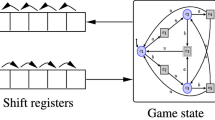Abstract
We introduce games with probabilistic uncertainty, a model for controller synthesis in which the controller observes the state through imprecise sensors that provide correct information about the current state with a fixed probability. That is, in each step, the sensors return an observed state, and given the observed state, there is a probability distribution (due to the estimation error) over the actual current state. The controller must base its decision on the observed state (rather than the actual current state, which it does not know). On the other hand, we assume that the environment can perfectly observe the current state. We show that controller synthesis for qualitative ω-regular objectives in our model can be reduced in polynomial time to standard partial-observation stochastic games, and vice-versa. As a consequence we establish the precise decidability frontier for the new class of games, and establish optimal complexity results for all the decidable problems.
Access this chapter
Tax calculation will be finalised at checkout
Purchases are for personal use only
Preview
Unable to display preview. Download preview PDF.
Similar content being viewed by others
References
Baier, C., Bertrand, N., Größer, M.: On Decision Problems for Probabilistic Büchi Automata. In: Amadio, R.M. (ed.) FOSSACS 2008. LNCS, vol. 4962, pp. 287–301. Springer, Heidelberg (2008)
Bertrand, N., Genest, B., Gimbert, H.: Qualitative determinacy and decidability of stochastic games with signals. In: LICS, pp. 319–328. IEEE Computer Society (2009)
Berwanger, D., Doyen, L.: On the power of imperfect information. In: FSTTCS, Dagstuhl Seminar Proceedings 08004. IBFI (2008)
Billingsley, P.: Probability and Measure. Wiley-Interscience (1995)
Büchi, J.R., Landweber, L.H.: Solving sequential conditions by finite-state strategies. Transactions of the AMS 138, 295–311 (1969)
Chatterjee, K., Chmelik, M., Majumdar, R.: Equivalence of games with probabilistic uncertainty and partial-observation games. CoRR, abs/1202.4140 (2012)
Chatterjee, K., Doyen, L., Henzinger, T.A.: Qualitative Analysis of Partially-Observable Markov Decision Processes. In: Hliněný, P., Kučera, A. (eds.) MFCS 2010. LNCS, vol. 6281, pp. 258–269. Springer, Heidelberg (2010)
Chatterjee, K., Doyen, L., Henzinger, T.A., Raskin, J.-F.: Algorithms for omega-regular games of incomplete information. LMCS 3 (2007)
Condon, A.: The complexity of stochastic games. I. & C. 96(2), 203–224 (1992)
Courcoubetis, C., Yannakakis, M.: The complexity of probabilistic verification. Journal of the ACM 42(4), 857–907 (1995)
de Alfaro, L., Henzinger, T.A., Kupferman, O.: Concurrent reachability games. TCS 386(3), 188–217 (2007)
de Alfaro, L., Majumdar, R.: Quantitative solution of omega-regular games. In: STOC 2001, pp. 675–683. ACM Press (2001)
Filar, J., Vrieze, K.: Competitive Markov Decision Processes. Springer (1997)
Kupferman, O., Vardi, M.Y.: μ-Calculus Synthesis. In: Nielsen, M., Rovan, B. (eds.) MFCS 2000. LNCS, vol. 1893, pp. 497–507. Springer, Heidelberg (2000)
Rabin, M.O.: Automata on Infinite Objects and Church’s Problem. Conference Series in Mathematics, vol. 13. American Mathematical Society (1969)
Reif, J.H.: Universal games of incomplete information. In: STOC, pp. 288–308. ACM Press (1979)
Thomas, W.: Languages, automata, and logic. In: Handbook of Formal Languages. Beyond Words, vol. 3, ch. 7, pp. 389–455. Springer (1997)
Vardi, M.Y.: Automatic verification of probabilistic concurrent finite-state systems. In: FOCS 1985, pp. 327–338. IEEE Computer Society Press (1985)
Author information
Authors and Affiliations
Editor information
Editors and Affiliations
Rights and permissions
Copyright information
© 2012 Springer-Verlag Berlin Heidelberg
About this paper
Cite this paper
Chatterjee, K., Chmelík, M., Majumdar, R. (2012). Equivalence of Games with Probabilistic Uncertainty and Partial-Observation Games. In: Chakraborty, S., Mukund, M. (eds) Automated Technology for Verification and Analysis. ATVA 2012. Lecture Notes in Computer Science, vol 7561. Springer, Berlin, Heidelberg. https://doi.org/10.1007/978-3-642-33386-6_30
Download citation
DOI: https://doi.org/10.1007/978-3-642-33386-6_30
Publisher Name: Springer, Berlin, Heidelberg
Print ISBN: 978-3-642-33385-9
Online ISBN: 978-3-642-33386-6
eBook Packages: Computer ScienceComputer Science (R0)




